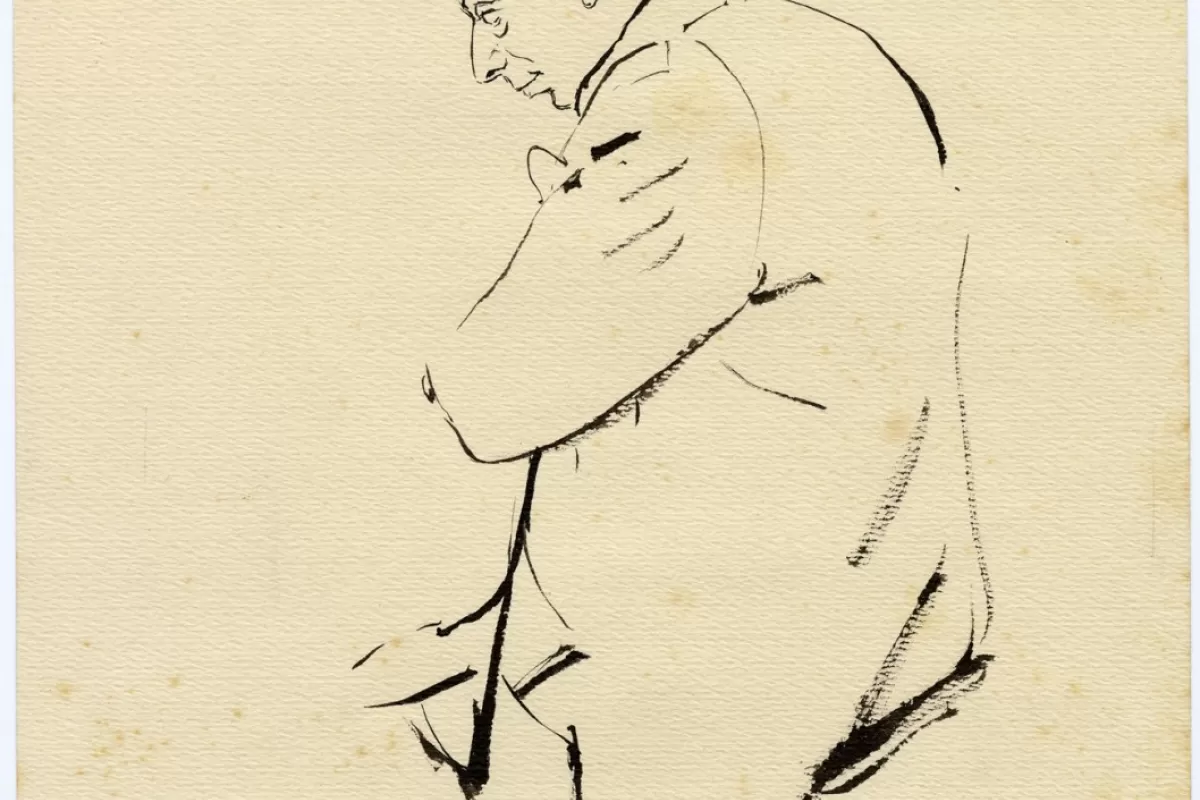Nov 16, 2012 - 12:00 pm
MOR’s Fifteenth Season Opens with the Daring Opera The Emperor of Atlantis!
Seattle Symphony Music Director Ludovic Morlot to conduct this courageous masterpiece.
This fall, our concert highlight is Viktor Ullmann’s opera The Emperor of Atlantis, composed in the Terezín concentration camp in 1943. Camp authorities halted its final rehearsals once they saw its provocative allusions to Hitler and his war machine. MOR’s bold new production is conducted by the Seattle Symphony’s Ludovic Morlot and directed by Erich Parce, with a stellar vocal cast and a chamber ensemble of Seattle Symphony players. You’ll also hear works by two composers who left Europe in the 1930s to escape the Nazi threat. Swiss-born Ernest Bloch settled in the United States, and Latvian-born Marc Lavry emigrated to Palestine. Both were deeply influenced by their roots in Jewish musical traditions that, Bloch said, give voice to a “complex, glowing, agitated soul.” As a composer and conductor, Lavry went on to become one of the most important figures in Israel’s musical life, and he had a central influence on the development of distinctively Israeli musical styles.
ABOUT THE MUSIC
Prayer (1924) -- (From Jewish Life)
Ernest Bloch
(b. Geneve, Switzerland, 1880 - d. Portland, OR, 1959)
For much of the 20th century, Ernest Bloch was the preeminent voice of a "Jewish" sound in concert music. Bloch was born into a home where the chants of Talmud study sank deeply into his musical memory. Later, his teachers include Emile Jacques-Dalcroze and Eugene Ysaye. In Geneva, he was a bookeeper in his father's business, while composing, conducting, and lecturing at the Geneva conservatory. Describing his music, Bloch stated: "It is the Jewish soul that interests me, the complex, glowing, agitated soul which I feel vibrating throughout the Bible...this is in me, and is the better part of me."
Bloch made a significant contribution to American musical life as director of the Cleveland Institute of Musci (1920-25) and the San Francisco Conservatory (1925-30). He lived for most of the 1930s in Switzerland, but emigrated to the United States in 1940 in reaction to the rampant anti-Semitism throughout Europe and the Third Reich's policies banning the performance, publication, and employment of Jewish composers. He was a professor at the University of California, Berkeley from 1942-52.
He composed From Jewish Life as a duo for cello and piano in 1924. The transcription we hear tonight was arranged by Alfredo Antonini for double bassist Gary Karr, who has graciously granted us permission to perform it.
Three Jewish Dances, Op. 192 (1945)
Marc Lavry
(b. Riga, Latvia, 1903 - d. Haifa, Israel, 1967)
"I immigrated to Israel in 1935 and immediately felt that I found my spiritual homeland...I felt that the country inspired me as a composer..." --Marc Lavry
Before Hitler's ascent to power, Marc Lavry was widely respected as a composer and conductor in Germany. After studying composition at the Leipzig Conservatory and conducting with leading figures such as Hermann Scherchen and Bruno Walter, Lavry held a conducting post at the Saarbrucken Opera House. In 1929 he became the conductor of the Berliner Sinfonieorchester.
Two months into the Nazi regime, Lavry returned to his native Riga, but then chose to leave after Latvia's own Fascist coup. He and his wife immigrated to Palestine in 1935, and Lavry quickly established himself as a composer, conductor, pianist, arranger, and orchestrator.
Lavry is considered one of the founders of the Israeli Mediterranean School of composition. Along with other European emigre composers such as Paul Ben Haim and Odeon Partos, he was inspired by his new surroundings. They came to feel that composing music in a purely European style betrayed their newly-found desire to compose Israeli music. Lavry's compositions drew on indigenous folk material, modal patterns, and the musical rhythyms of his adopted country. He sought a musical style that was transparent, emotionally communicative, and dominated by melody. He wrote over 400 musical works, ranging from grand opera and symphonic works to chamber music and popular songs.
Three Jewish Dances exists in several versions--for solo piano, violin and piano, and violin and orchestra. The set includes two wedding dances and a hora, a traditional Israeli dance characterized by short symmetrical phrases, simple harmonies, and duple meter. In 1945, Lavry also composed Dan ha'shomer (Dan the Guard), generally considered the first opera to be composed and produced in Israel. With a libretto by Max Brod, it tells the story of members of a kibbutz who are surrounded by the enemy and also face their own inner conflicts. Throughout the music, Lavry juxtaposes Eastern European musical motifs against Middle Eastern ones as a way of distinguishing between the older generation of immigrants from Eastern Europe and the next generation of pioneers and kibbutz workers. The opera received 33 performances in eight cities and towns in Palestine, and made a significant impact. In fact, the composer and his wife decided to name their first two children after the opera's lead characters: Dan and Efrat.
The Emperor of Atlantis (Terezín, 1943)
Viktor Ullmann
(b. Teschen, Silesia, 1898 - d. Auschwitz, 1944)
Libretto by Peter Kien
(b. Varnsdorf, Czechoslovakia, 1919 - d. Auschwitz, 1944)
Make us prize all human worth;
to other lives awaken.
Let this commandment be our truth:
The great and sovreign name of Death
must not be lightly taken!
-Peter Kien, translation by Aaron Kramer
The Emperor of Atlantis is a most unlikely opera: a stinging mockery of war, and passionate affirmation of life, created in the Nazi concentration camp where it couldn't be performed. Its composer, Viktor Ullmann, was raised a Catholic and later converted to Protestantism before returning to Catholicism. His Jewish parentage, however, consigned him under Nazi racial laws to a fate that sent him from Prague first to Terezín and then to his death at Auschwitz.
Ullmann was born in a part of Silesia that now is part of the Czech Republic, and spent most of his youth in Vienna, where he was strongly influenced by his musical studies with Arnold Schoenberg. Returning to Prague in 1919, Ullmann became a protege of Alexander Zemlinksy at the New German Theater, where he conducted with increasing frequency in the 1920s. He also began composing, creating an oeuvre that eventually included solo piano and chamber music, orchestral pieces, songs and choral works, and opera. Until the German occupation, Ullmann played a prominent role in Prague's musical life as a composer, conductor, and critic.
When Czechoslovakia came under Nazi control, the performance of Ullmann's works was banned, and a public musical life became impossible for him. He tried unsuccessfully to emigrate, but was able to arrange places for two of his children on a Kindertransport to Sweden and then England. Ullmann was deported to Terezín on September 8, 1942. During his two years of incarceration there, he was at the center of the camp’s intellectual and artistic life. In Terezín he composed over twenty musical works, and perhaps others that have been lost. This extraordinary output includes a string quartet, piano sonatas, song cycles, choral works, incidental music for a play, and an opera libretto. Rediscovering his family origins, he composed a number of works based on traditional Jewish themes, including a set of haunting Yiddish and Hebrew songs that MOR has performed in concerts with the Northwest Boychoir.
Der Kaiser von Atlantis (The Emperor of Atlantis) is the product of Ullmann’s collaboration in Terezín with the young poet Peter Kien. Its original subtitle, oder Die Todverweigerung (Or, the refusal of Death) has also been presented as oder Der Tod dankt ab (Or, Death’s abdication). Its 20 short sections span a range of musical styles, with seven singing characters and an eclectic instrumental ensemble that includes instruments such as banjo and harmonium.
Ullmann and Kien clearly meant The Emperor of Atlantis as a statement about the setting and cir-cumstances in which it was created. The score’s mocking quote of the Nazi anthem Deutschland über Alles, disfigured by its presentation in a minor key, removes any doubt from the intended irony of the title character’s name: Kaiser Überall. Yet it would be a mistake to view the work simply as a crude gesture of satirical protest. Andrew Porter, in The New Yorker, has summarized the story:
"The plot is no cut-and-dried allegory but an elusive death-welcoming parable about a mad, murderous ruler, possibly redeemed at last, who says farewell to the world in a mock-Faustian vision of a natural paradise no longer spoiled by men; had his dream come true all men would be dead. The Emperor of Atlantis, ruler over much of the world, proclaims universal war and declares that his old ally Death will lead the campaign. Death, offended by the Emperor's presumption, breaks his sabre; henceforth men will not die. Confusion results: a Soldier and a Girl-Soldier from opposite sides sing a love duet instead of fighting; the sick and suffering find no release. Death offers to return to men on one condition—that the Emperor be the first to die. He accepts and sings his farewell."
Ullmann revised the score several times in Terezín, and had hoped to produce it there with a cast of his fellow prisoners. Rehearsals were underway, but camp officials prohibited any performances when they discovered the work and its provocative depiction of Hitler and the Third Reich. On October 16, 1944, Ullmann and Kien were sent to Auschwitz on the same transport, where they both perished soon after arriving.
The world knows The Emperor of Atlantis because Ullmann entrusted his manuscripts to another prisoner, the camp librarian Emil Utiz. Utiz survived and passed the manuscripts along to another survivor, Ullmann’s friend Hans Adler. Eventually a marked-up working version of The Emperor of Atlantis came to the attention of British conductor Kerry Woodward, who prepared a performance edition. Woodward conducted the world premiere in Amsterdam with The Netherlands Opera on December 16, 1975. Since then the opera has been performed with increasing frequency around the world.
The Emperor of Atlantis is a compelling work of musical theater, but also much more. It stands as eloquent testimony to Ullmann’s artistic and intellectual courage. Even amid the horrors of a concentration camp, Ullmann never lost his deep sense of human dignity. He wrote: “It must be emphasized that Terezín served to enhance, not to impede, my musical activities, that by no means did we sit weeping on the banks of the waters of Babylon, and that our endeavor with respect to the Arts was commensurate with our will to live.”
We are grateful to Maestro Ludovic Morlot for helping to make this production possible.
About the Music notes by Mina Miller. Copyright Music of Remembrance.






